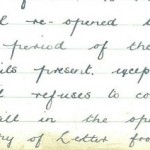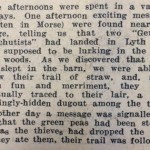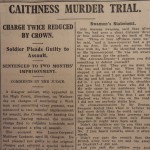After recent rains had slowed the German advance on Moscow, now temperatures began to fall and the troops had to cope with snow and ice. The Soviet Government evacuated the city, and many heavy industries were moved by rail, but Stalin remained. The Germans were now close enough for the Luftwaffe to launch air raids on Moscow. On 13 October German forces launched an offensive on the Soviet defences around the city, the Mozhaisk line. As the situation became desperate Soviet reinforcements were transferred to Moscow from Siberia. Elsewhere, on 17 October the United States suffered its first military casualties of the war when the destroyer USS Kearney was torpedoed by a German U-boat.

Schools across Caithness went back after the second holiday of the summer, which had been granted so that children could help with the harvest. On Monday 14 October poor Frank Dunnett was still prevented from attending Brabster School because of the bull: “School re-opened today after the Autumn period of the Vacations. All pupils except Frank Dunnett who still refuses to come, the bull being still in the open hill.”

But on the next day, a short note in the school log book shows that the saga had finally come to an end: “15th October. Frank Dunnett is back today. All pupils present. The bull has been removed.”
 The Director of Education wrote to a Miss Mackenzie of Brora this week to offer her the post of teacher at Lieurary School. There was a slight complication, however: only the larger schoolhouse had a bathroom, and it “… was let to two old ladies. It may be difficult to dispossess them… I know it is difficult for you to make a decision without having seen the houses, but perhaps you will be good enough to let me know whether you would be prepared to occupy the smaller house or whether steps should be taken to evacuate the present tenants.”
The Director of Education wrote to a Miss Mackenzie of Brora this week to offer her the post of teacher at Lieurary School. There was a slight complication, however: only the larger schoolhouse had a bathroom, and it “… was let to two old ladies. It may be difficult to dispossess them… I know it is difficult for you to make a decision without having seen the houses, but perhaps you will be good enough to let me know whether you would be prepared to occupy the smaller house or whether steps should be taken to evacuate the present tenants.”
The St Fergus Girl Guides had spent a week at Swartybank, Lyth. The John O’Groat Journal included a report by them of their activities: “One afternoon, exciting messages (written in Morse) were found near the Bridge, telling us that two “German parachutists” had landed in Lyth and were supposed to be lurking in the Barrock woods. As we discovered that they had slept in the barn, we were able to follow their trail of straw, and, after much fun and merriment, they were eventually traced to their lair, a very cunningly-hidden dugout among the trees.”
The next day a theft was reported, and the Guides were soon on the trail: “Another day a message was signalled to say that the green peas had been stolen, and as the thieves had dropped the pods as they ate them, their trail was followed too.”
 The John O’Groat Journal also reported that a Glasgow soldier, Matthew Lorimer, was tried in Aberdeen this week, accused of murdering a Wick man and assaulting several other persons. A group of soldiers had travelled on the bus from Lybster to Wick back in August, and soon after leaving Lybster an altercation had started between some of the locals and the soldiers. It was alleged that the locals had suggested that the soldiers were only Home Guard, and accused the British Army of running away at Dunkirk. A fight broke out, and when it was over Donald Bremner Macleod lay dead. But in the course of the trial it emerged that there was no way of proving that Mr Macleod’s injuries were the result of the fighting, nor of proving just who had struck whom; and in the end the charges were dropped, except for one of assault, and Matthew Lorimer was allowed to go free.
The John O’Groat Journal also reported that a Glasgow soldier, Matthew Lorimer, was tried in Aberdeen this week, accused of murdering a Wick man and assaulting several other persons. A group of soldiers had travelled on the bus from Lybster to Wick back in August, and soon after leaving Lybster an altercation had started between some of the locals and the soldiers. It was alleged that the locals had suggested that the soldiers were only Home Guard, and accused the British Army of running away at Dunkirk. A fight broke out, and when it was over Donald Bremner Macleod lay dead. But in the course of the trial it emerged that there was no way of proving that Mr Macleod’s injuries were the result of the fighting, nor of proving just who had struck whom; and in the end the charges were dropped, except for one of assault, and Matthew Lorimer was allowed to go free.
